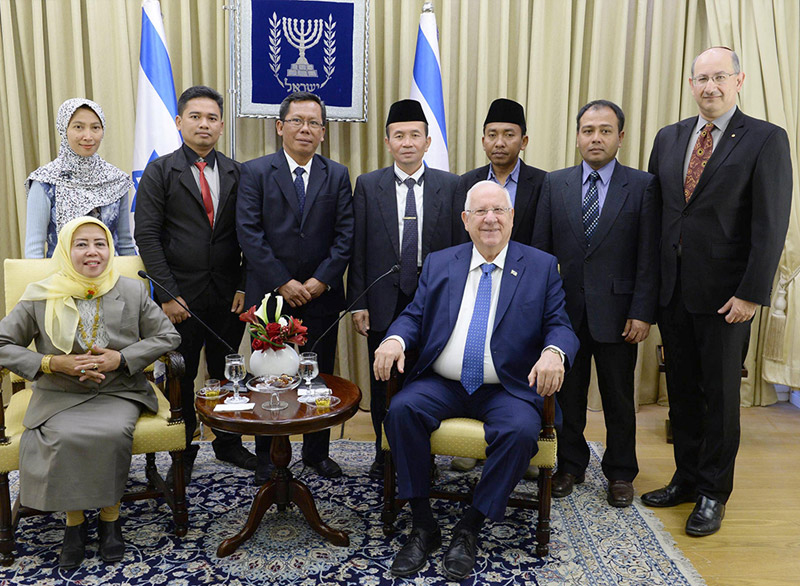Australia/Israel Review
The Last Word: Under the same sun
Mar 3, 2017 | Jeremy Jones

Jeremy Jones
Three corners of a triangle. On one, a group of Muslim men and women saying their Asr prayers. On another, a group of Jewish women and men saying Mincha prayers. The third occupied by a circle of Christians, studying Biblical passages.
The venue was a rooftop of an historic Church, in the Old City of Jerusalem. It was mid-winter, but the sun was not merely shining but almost blinding in its intensity.
As each individual ended their rituals, they entered a meeting hall, to discuss religion, peace and Jerusalem.
Book-ended by beautiful Jewish and Muslim religious chants and a presentation on the wisdom of the late Abdurrahman Wahid (Gus Dur), the participants had a unique opportunity for open, honest, informed and passionate exchange of wisdom, opinions and knowledge.
This remarkable session was towards the conclusion of a day which had began with nine Indonesian Muslim religious leaders on AIJAC’s Rambam program meeting with Israel’s President, Reuven Rivlin. They gave Indonesian perspectives while respectfully listening to an outline of an Israeli vision for peace and interreligious cooperation from Rivlin.
This was the final day of a week of dialogues, meetings, touring and study in Israel and with three separate visits to areas administered by the Palestinian Authority.
Gus Dur had been an outstanding political and religious personality in Indonesia, who had a global impact.
As well as guiding the world’s most populous Muslim-majority country through the early years of democracy, he also led the world’s largest Muslim organisation, Nahdlatul Ulama, which has as many as 60 million members (and up to 91 million people associated with it through their families). Gus Dur was the senior Muslim figure on the Board of the Elijah Institute for Interfaith Wisdom, and it was that Institute which organised the prayer session at the Ecce Homo Convent.
He was also a friend of Shimon Peres (z.l.) and it was in honour of this relationship, and due to the impressive CVs of the group, that President Rivlin hosted the Indonesian group.
As well as meeting with a number of the top Israeli and Palestinian analysts, touring the areas near the Lebanese, Syrian, Jordanian and Gaza borders, visiting the Yasser Arafat Museum and exploring a number of cities and towns, there was an important religious element to the program.
Rabbis David Rosen, Ian Pear and Alan Goshen-Gottstein showed considerable expertise in helping Muslim scholars and leaders understand Jewish perspectives, while answering question after question on issues relating to dialogue between Jews and Muslims.
In Ramallah, Bethlehem, Jerusalem, Abu Ghosh and Jaffa, they met with Muslim leaders who spoke about their lives and attitudes toward Jews and Israelis.
Daily prayers were conducted in the Al Aqsa Mosque, the beautiful new Mosque in Abu Ghosh, historic mosques in other cities and by the shores of the Dead Sea.
One unique evening was spent in a restaurant on the shores of the Mediterranean, with young Israeli Jews, Christians and Muslims who were involved in innovative and inspiring social projects.
There were also emotional moments.
In the mosques, and in the homes of Muslims in the Galilee and Abu Ghosh, the connection with fellow believers was of great import.
In Yad Vashem, the exposure to a part of the world history which was basically unfamiliar or even unknown, was very powerful.
Meeting Syrian civilians being treated in Israeli hospitals, with the support of Arabic-speaking Christians and Muslims, and Israeli doctors, led to a discussion on how much more could be done, on a humanitarian basis, by people of goodwill wherever they may be.
Spending time with the children whose lives were being changed so dramatically at Save A Child’s Heart not only prompted admiration for that amazing NGO’s work, but also planted seeds of future cooperation.
Spending time with these Muslim leaders, I felt encouraged that not just cooperation, but Muslim-Jewish friendship, is a genuine possibility.






